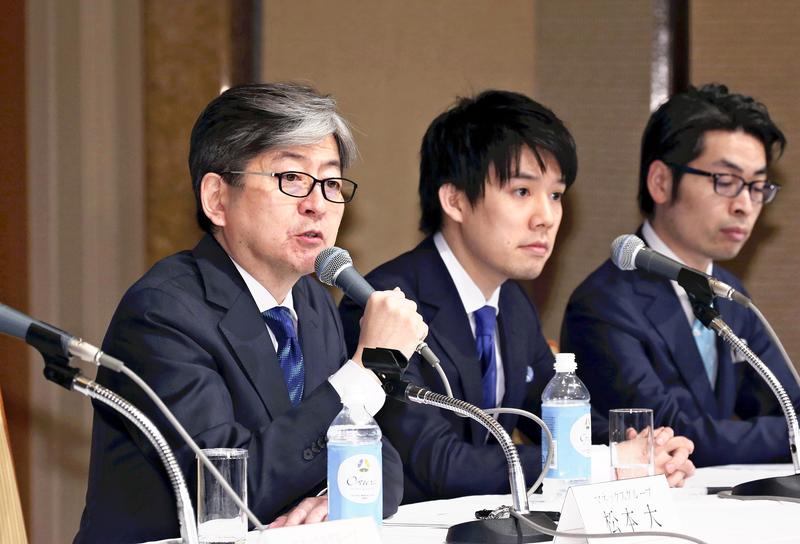
Troubled virtual currency exchange operator Coincheck Inc. has decided to seek a fresh start under the umbrella of online brokerage Monex Group Inc.
Following a hacking incident in which a massive amount of Coincheck customers' funds were lost, the Financial Services Agency has stepped up its monitoring of the virtual currency industry and some operators with sloppy management have been forced out. Meanwhile, major companies from different industries have entered the virtual currency industry one after another, expecting high growth.
On Friday, Monex Managing Director and Chairman Oki Matsumoto said at a press conference, "I believe there is a strong and huge future in virtual currency," adding, "Coincheck has technology and [a large] customer base." Matsumoto also expressed his desire for a future initial public offering of the company's stock.
The reason behind the high expectations for Coincheck, which suffered the massive loss of virtual currency, is the company's high profitability.
According to documents released on Friday by Monex, the final profit of Coincheck for the business year ended in March 2017 stood at 471 million yen. It is expected that the company recorded more profit for the year ended in March this year due to expansion of virtual currency trading.
The net assets of Coincheck at the end of March 2018 are likely to have exceeded those as of the end of March 2017, even after compensation is made to holders of the stolen virtual currency NEM, according to the released documents. The amount of compensation is believed to be around 46 billion yen. It means that the company made a large profit, exceeding the amount of compensation over the year.
Profit margin high
In the business of virtual currency exchange, high service fees, which are several percent of the amount of transactions, are expected. The profit margin is incomparably higher than that of the securities industry, which has been facing fierce competition to lower its fees.
Another motive for Monex to buy Coincheck is acquiring its large number of customers, with 1.7 million accounts. In addition, Monex has been forced to engage in an uphill battle with rivals, such as SBI Securities Co. and Rakuten Securities, Inc., in its main business of online securities transactions.
Sources in the financial sector say that the 3.6 billion yen purchase price for Coincheck is too cheap. However, the released documents include a note saying it is possible that the price could be increased by up to half of profit in the future. As a result, the final purchase price could become much higher. While a risk of litigation against NEM holders remains, the prospects for Coincheck remain unclear.
As for Coincheck, its sloppy internal management system became apparent in the wake of the massive virtual currency loss incident.
Taking the situation seriously, the FSA issued business improvement orders twice to the company, calling for a drastic overhaul of the management system. To continue its business, there was no choice but for the company to receive capital from other companies.
Coincheck President Koichiro Wada and director Yusuke Otsuka will both remain as executive directors, but resign from their current positions.
At a press conference Friday, Monex's Matsumoto said he aims to make Coincheck a formally registered virtual currency exchange in about two months and fully resume its operations.
Referring to the registration of Coincheck, Taro Aso, in his capacity as the state minister for financial services, said the prospect of registering Coincheck depends on "how far [the company] could work on" restructuring its management system.
More than 100 companies are aiming to register as virtual currency exchange operators. High-profile companies such as Line Corp. and Yahoo Japan Corp. have recently unveiled their plans to enter the industry. These companies expect that gaining a foothold in the exchange business would help them expand activities into money transfer and settlement services.
But the FSA has been stepping up its strict surveillance over virtual currency exchange operators since the Coincheck incident came to light. On Friday, the FSA announced punitive measures against virtual currency exchange operators, the second move of its kind. Some among quasi-operators of virtual currency exchanges have expressed an intention to close their businesses, saying they cannot meet the high requirements set by the FSA.
The FSA will likely compile new operational guidelines to screen applications for registration. As discussions continue on how to review regulations, the number of operators that would choose to close their businesses or withdraw registration applications might increase further.
Read more from The Japan News at https://japannews.yomiuri.co.jp/







